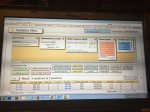BeautifulDay
Senior Member
- Messages
- 372
Can you say what your expertise is in this field? Hobbyist? Undergrad, Masters, Clinical practice?
Me, I was forced into learning genetics from the ground up like many here. I had to fight the stigma of being diagnosed with chronic fatigue for years. I was told all my symptoms were due to stress and I just needed to reduce my stress, get more sleep, not be lazy, and work out harder. Ughhhhh.
So I pushed and read medical literature. Then my kids started getting sick. Very sick. Autistic spectrum and hearing issue, severe lung infections from vocal cord and diaphragm weakness, our youngest started having intermittent foot drop in kindergarten, POTS, stomach and digestion issues, muscle spasticity, terrible headaches, fatigue...... I asked if all our symptoms could be related, but the doctors told me they were all unrelated. I then kept pushing the doctors to look for answers and they kept dismissing me as nuts. Then I found the Mitochondrial issue through my own research and testing. So being a mother on a mission paid off. A top mito clinic is now studying our family.
So to answer you - self taught. I made lots of wrong turns on the way to figuring it out for us. But I couldn't give up. I have gone and still go to the doctors medical conferences and read the original medical journals never relying on any news articles interpretation. I'll read the news articles occasionally to see how they quote the doctor, but it's the studies themselves which have the most important details. Many articles often get the details of studies wrong.

